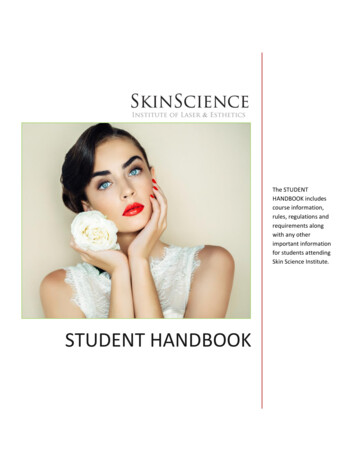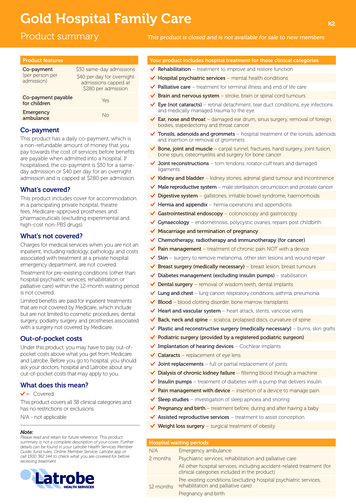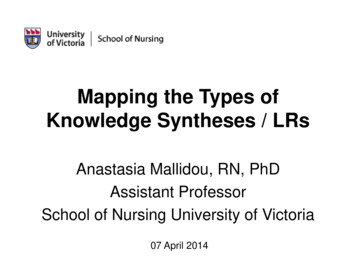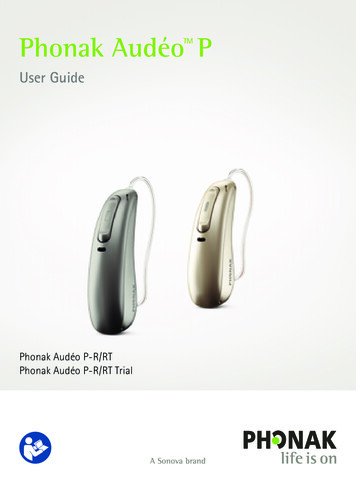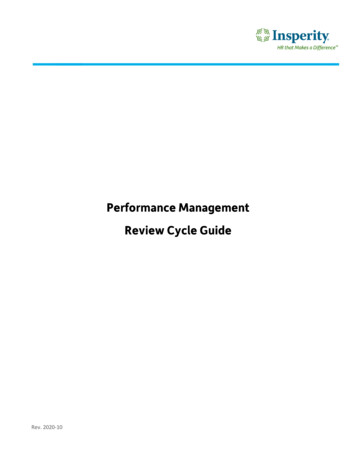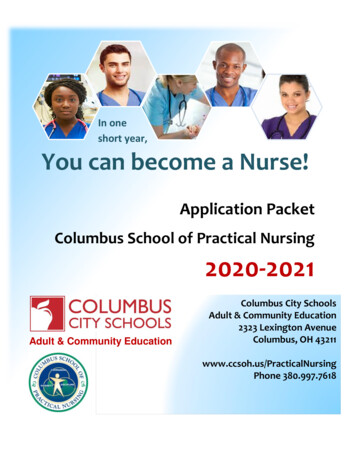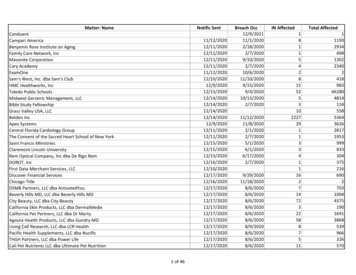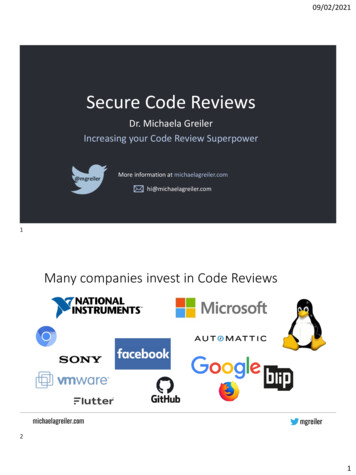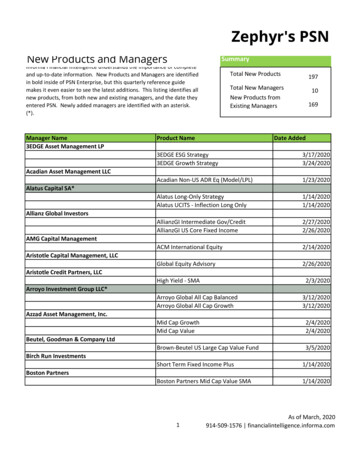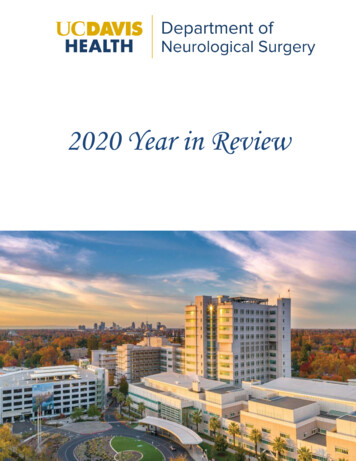
Transcription
2020 Year in Review
2020 Message from the ChairLetter from the ChairGriffith R. Harsh IV, M.D., M.A., M.B.A.Professor & Julian R. Youmans EndowedChairThough 2020 and COVID-19 brought considerable challengesI am pleased the department continues to grow and evolve itsclinical programs.We welcomed several new faculty members early in the year,cerebrovascular neurosurgeon Dr. Branden Cord, spineneurosurgeon, Dr. Allan Martin, neurocritical care specialist, Dr.Jeffrey Vitt and neuro-oncologist Dr. Orwa Aboud. Each ofthese new faculty members has had considerable effect intheir respective areas and we are pleased to see theircontributions making an impact in teaching and patient care.The COVID-19 pandemic became reality in March and we quickly adapted to working remotely.Stacy Miller, our Chief Administrative Officer did an outstanding job of transitioning staff to remotework and their efforts to keep things running smoothly have contributed to maintaining a high levelof productivity in spite of massive change. We moved our standing meetings to virtual platforms,and I am proud of our entire staff for how they handled and responded to this challenge.The residency program continues to thrive under the direction of Dr. Kia Shahlaie. In June wecelebrated the graduation of Dr. Seun Omofoye with a virtual ceremony simultaneously broadcast onFacebook Live. With the help of resident physicians Drs. Dylan Goodrich and Tejas Karnati, wecreated a program video to highlight the strengths of our program and the role we have in ourcommunity. In December we completed two full days of resident applicant interviews which tooksignificant planning and effort by both Dr. Shahlaie and Staci Leitner. I appreciate their willingness toembrace change and their creative approach to problem solving.Our Advanced Practice Providers moved to a 1:1 model this year which has been positively received.Their contributions to providing outstanding patient care and throughput have improvedcommunication and patient satisfaction and we value their efforts.We welcomed Dr. Amy Brooks-Kayal in October as she moved into her role as Professor and Chairand the Andrew John Gabor, M.D., Ph.D., Presidential Endowed Chair of the Department ofNeurology. I look forward to the continued collaboration and partnership between both departments.In January of 2021, Patrick Fuller, Ph.D. will join our research program as a professor and the vicechair of research. Dr. Fuller brings a wealth of research experience, mentorship and leadership,and we look forward to his contributions to our research program.I thank each member of the department for your willingness to adapt and the flexibility you havedemonstrated throughout 2020. Despite much change, we continue to thrive, and it is through ourteamwork, collaboration, mutual respect and coordinated efforts to prioritize patient care andeducation, that we are able to overcome the most pressing of challenges.I look forward to our continued departmental growth and excellence in 2021.
2020 Faculty RecruitmentsFaculty RecruitmentWe were pleased to add four new faculty members to the Department of NeurologicalSurgery in 2020.Allan Martin, M.D., Ph.D.SpineDr. Martin earned his Medical Degree in 2011 at the University of Toronto andcompleted his Ph.D. in 2017 at the University of Toronto, Institute of MedicalSciences Surgeon Scientist Training Program. He graduated from theneurological surgery residency program at the University of Toronto in 2019 andcompleted a spinal fellowship in June of 2020. Dr. Martin works closely with Drs.Kee Kim and Julius Ebinu in the Comprehensive Spine Center.Branden Cord, M.D., Ph.D.CerebrovascularDr. Cord completed a neurovascular fellowship in 2020 at Yale-New HavenHospital in New Haven, Connecticut. He earned his Medical Degree and Doctorof Philosophy in Medical Science in 2012 at Stanford University. Dr. Cordgraduated from the Neurological Surgery Residency Program at Yale-New HavenHospital in 2019 and completed an enfolded neurointerventional fellowship in2017. Dr. Cord joins Dr. Ben Waldau in providing cerebrovascular neurosurgicalservices here at UC Davis.Jeffrey Vitt, M.D.Neurocritical CareDr. Vitt earned his Doctor of Medicine at the Georgetown University School ofMedicine in Washington, DC in 2014. He graduated from the Neurology ResidencyProgram at the University of California, San Francisco in 2018 and completed hisClinical Fellowship in Neurocritical Care also at the University of California, SanFrancisco in June of 2020. Dr. Vitt works closely with Drs. Martin andZimmermann on the neurocritical care service.Orwa Aboud, M.D., Ph.D.Neuro-OncologyDr. Aboud earned his medical degree at Damascus University in 2007. Hecompleted his Ph.D. in neurobiology and neurosciences in 2013, and hisresidency training in neurology in 2017 at the University of Arkansas forMedical Sciences. Dr. Aboud has completed a three-year program in clinicaland research neuro-oncology training at the joint National Cancer Instituteand Johns Hopkins University. His research includes designing clinicaltrials for glioblastoma patients. Dr. Aboud joined the department in Augustand works closely with Dr. Bloch in our Brain Tumor Program.
2020 Faculty RecruitmentsPatrick M. Fuller, Ph.D., joins the faculty in January of2021. Dr. Fuller is a UC Davis graduate. He earned hisM.S. in Exercise Physiology in 2001 and his Ph.D. inMolecular, Cellular and Integrative Physiology in 2004,both at UC Davis. Dr. Fuller completed a neurosciencefellowship in the Department of Neurology at Beth IsraelDeaconess Medical Center in 2007 and has been workingin the Division of Sleep Medicine as an AssociateProfessor of Neurology at Harvard Medical School andBeth Israel Deaconess Medical Center.Dr. Fuller was recruited to the Department of Neurological Surgery as a Target ofExcellence recruitment. He has garnered significant extramural funding as the PrincipalInvestigator for (3) R01 grants and Co-Principal Investigator on two additional R01’s. Hisinvestigative efforts focus on the cellular and synaptic basis by which the brain regulatessleep, wakeful consciousness and circadian rhythms, aligning with evidence thatsuggests sleep and biological clocks impact neurological function. Using transgenicmouse models and optogenetics, Dr. Fuller has made meaningful contributions tounderstanding how the specific neural circuits and brain regions regulating sleep onsetand timing are controlled. Dr. Fullers work will compliment current departmentresearch efforts in electrophysiological approaches to TBI, epilepsy and cognition.Open Faculty RecruitmentsThe Department of Neurological Surgery is currently engaged in the following activefaculty searches: Functional Neurosurgeon Pediatric Neurosurgeon Part-time Spinal Neurosurgeon Neuroprosthetics ResearcherFaculty recruitment listings can be located on https://www.recruit.ucdavis.edu
Michael S. B. Edwards, M.D.Kia Shahlaie, M.D., Ph.D.Marike Zwienenberg, M.D.The separation surgery for Abigail and Micaela Bachinskiy began on October 24th andlasted 25 hours. It took months of planning meetings, and virtual simulation sessionsand an incredible amount of organization and teamwork for this surgery to be a success.We appreciate the contributions of everyone who participated in this extremely rareopportunity to separate the twins; however, we are especially proud of our facultymembers, Dr. Michael Edwards, Dr. Kia Shahlaie and Dr. Marike Zwienenberg. Theentire team was comprised of over 30 people and included surgeons, anesthesiologists,nurses and key surgical staff and the surgery took place in the UC Davis Children’sSurgery Center in an operating room specifically built for complex cases such as this.The girls went home in late December and have made remarkable progress.
Read the article: Rare set of conjoined twins successfully separated in 24-hour surgeryat UC Davis Children’s Hospital and watch the 5 part video series: Conjoined TwinsSeparation.We appreciate all of the effort that went into planning and preparing for this complexsurgery and applaud Drs. Edwards, Shahlaie and Zwienenberg, and the entire team onthis outstanding achievement.
ConfrontingBrain TumorsUC Davis Neurological Surgery is thefirst in the region to add NeuroBlate’sLaser Interstitial Thermal Therapy(LITT) to it’s arsenal of tools for thetreatment of brain tumors. In Augustof 2020, Dr. Orin Bloch, Director ofthe Brain Tumor Program, used LITT’sminimally invasive laser technology todissolve a patient’s brain tumor andthe patient was able to return homethe following day. This technologywill be particularly useful for treatingpatients with small or recurringtumors. LITT may also be used to treatEpilepsy in both adults and children.For additional information aboutNeuroBlate in the Sacramento region,patients and referring physicians cancontact the UC Davis Health BrainTumor Program at 916-731-1098.
UC Davis Health Neurological Surgery is hometo a robust multidisciplinary adult and pediatricbrain tumor program which spans severaldepartments. We are dedicated to providingthe highest quality of care to our patientpopulation and to conducting breakthroughresearch in immunotherapy and the discoveryand application of novel brain tumor treatments.Orin Bloch, M.D.Associate Professor & Director Brain Tumor ProgramWe are the largest Brain Tumor Program inNorth Central California with a catchment thatextends into Nevada and Oregon. We performover 500 brain tumor procedures annually,treating gliomas, meningiomas,craniopharyngiomas, skull base tumors, headand neck malignancies, chordomas, pituitarytumors, acoustic neuromas, metastatic tumors,and more. We provide full diseasemanagement.We utilize brain and motor mapping,intraoperative neuromonitoring and use bothawake and asleep craniotomies for eloquenttumors.In addition to LITT, we are approved forBrachytherapy treatment using GammaTileTherapy to treat gliomas and recurrentmetastasis. The brain metastasis programutilizes both the IKON Gamma Knife and LINACStereotactic Radiosurgery and surgicalresection.We are fully equipped with BrainLab andStealth Navigation systems and software forbrain tumor and skull based resections.
AugmentingRealityUC Davis Neurological Surgery isusing mixed reality goggles to helpprovide optimal patient care. Utilizingthe MagicLeap Goggle system we areable to load MRI’s and CT scans into aplanning station and examine andmanipulate virtual models to plan forhighly complex procedures. Inaddition to surgical planning, this is anoutstanding teaching tool, whichhelps us educate students, residentsand families. This system is aremarkable advancement and helpsus provide the very best clinical carefor our patients.
AdvancingClinical ResearchUC Davis Neurological Surgery iscontinuously improving the ways in whichwe deliver outstanding neurological surgicalcare. From artificial discs and bonemodeling studies to finding ways tomeasure intracranial pressure and braintissue oxygenation in our traumatic braininjury patients, we are dedicated to workingat the frontier of discovery and innovation.With a team of physician investigators andclinical research specialists we seek novelways to impact change and create optimaloutcomes for our patient population. Thestudies mentioned here are open toenrollment.Nancy Rudisill, N.P., Reva Vishwasrao and Dr. Ryan Martingathering patient information in the Neurosurgical ICU.Dr. Matthew Kercher, PGY-2 preparesto place a brain tissue oxygenmonitoring device (PbtO2) in atraumatic brain injury patient as part ofthe Brain Oxygen Optimization inSevere TBI (BOOST3) study. BOOST3is a multi-center trial led by Dr. LaraZimmermann here at UC Davis.
Epilepsy ResearchUnderstanding the connection betweentraumatic brain injuries and thedevelopment of epilepsy is one of ourhighest priorities. Our clinicalinvestigators take a collaborativeapproach and work with investigatorsand researchers from other institutionsto collect and analyze data in the preclinical phase and translationalresearch phases to help us findeffective treatments.Clinical Investigators:Lara Zimmermann, M.D.Assistant ProfessorRyan Martin, M.D.Assistant ProfessorJeffrey Vitt, M.D.Assistant ProfessorEpiBioS4RxUC Davis Health is ahead in the race toenroll subjects in the EpilepsyBioinformatics Study for AntiepileptogenicTherapy (EpiBioS4Rx). This large,multicenter study is designed to increasecollaborative research efforts acrossmultidisciplinary teams of basic and clinicalneuroscientists with access to extensivepatient populations. UC Davis is one of 13TBI Centers that will follow patients for twoyears.Imaging of Glial Activation and Risk forPost Traumatic EpilepsyDr. Ryan Martin is the Principal Investigatoron this Department of DefenseCongressionally Directed Award designedto better understand epilepsy in patientswith acute TBI. We are enrolling 30patients for this study.UC Davis – David Grant Medical Center TBINeural Network-Precision MedicineParadigm for Complex TraumaDr. Ryan Martin and Dr. Tina Palmieri are coPI’s on this grant.
Spine StudiesThe Department ofNeurological Surgery at UCDavis Health is advancingspinal health by evaluatingnew treatments such as stemcell use for disc regenerationand bony healing, duralsealants, and discreplacement technologies.Led by Dr. Kee Kim, CoDirector of the Spine Clinic,we are enrolling subjects inmultiple investigations.Below: Dr. Allan Martin and Chief Resident Dr.Amir Goodarzi participate in a pivotal clinical trialevaluating the safety and effectiveness ofAdherus AutoSpray and Adherus Autospray ETdural sealant when used as a dural sealant inspinal procedures. Primary Investigator: Kee D.Kim, M.D.The purpose of the study is to demonstrate thatAdherus Dural Sealant is safe and effective atachieving water-tight closure when used as anadjunct to standard methods of dural repair forspinal procedures as compared to DuraSealExact.Genetic and Protein Biomarkers of Posttraumatic Epilepsy to Improve Prediction ofPTEDr. Zimmermann and Dr. Michael Rogawskifrom the Department of Neurology are CoPI’s on this Department of Defenseprospective study.
SACRAMENTO MAGAZINE2020 TOP DOCTORSFour faculty members of theDepartment of Neurological Surgerywere honored by SacramentoMagazine for being the among theregion’s Top Doctors. Two hundredand forty UC Davis Health physicianswere listed in more than 61 specialtyareas. Dr. Zwienenberg was honoredin both the adult and pediatricmedicine. The list is compiled byProfessional Research Services, LLCa third-party firm and is based onpeer- review surveys.Griffith Harsh, M.D., M.B.A.Professor and ChairDepartment of Neurological SurgeryKee D. Kim, M.D.Professor and Co-DirectorUC Davis Spine CenterKiarash Shahlaie, M.D., Ph.D.Professor and Program DirectorDepartment of Neurological SurgeryMarike Zwienenberg, M.D.Associate ProfessorDepartment of Neurological Surgery
2020 Residency ProgramCongratulations to our 2020Residency Program Graduate!Oluwaseun Omofoye, M.D. was our2020 Residency Program Graduate.Dr. Omofoye earned an M.S. inmechanical engineering in 2007 fromColumbia University. He completed hisMedical Degree and first 5 years ofneurosurgery residency at theUniversity of North Carolina. Hecompleted a clinical neurosurgeryfellowship at Boston Medical Centerand joined the UC Davis NeurologicalSurgery Residency Program in 2018.He exhibited phenomenal clinicalgrowth and academic productivity. Heis a superb physician, excellentsurgeon and he has been anoutstanding Chief Resident, who wasadmired for demonstrating calm,capable leadership and adroitlymanaging an extremely busy service.By the end of his residency, Dr.Omofoye had amassed an impressivepublication and presentation recordand was the selected recipient of the2019-2020 James E. Boggan ResidentScholar Award. We wish him the verybest as he transitions into his yearlongfellowship in neurosurgical oncology atCedars-Sinai in 2021 and into hisneurosurgery career. We hope to bringDr. Omofoye back to UC Davis in 2021for an in-person graduation ceremony.
2020 Residency ProgramResidency Program NewsThe Department of Neurological Surgery welcomed two new interns on July 1, 2020,Jose Castillo, M.D. who graduated from Virginia Commonwealth University and IreneFalk, M.D., who graduated from the Medical College of Augusta University.Jose Castillo, M.D.Irene Falk, M.D.
2020 Residency ProgramCatherine (Kate) Peterson, M.D. and Dylan Jake Goodrich, M.D. joined thedepartment in March. Dr. Peterson graduated from Indiana University and is aPGY-6 and Dr. Goodrich graduated from St. George’s University and is a PGY-4.Kate Peterson, M.D.Dylan Jake GoodrichChief ResidentsResident physicians Amir Goodarzi, M.D., and Joti Thind, M.D., took the helmas co-chief residents in July and will serve until June 30th of 2021. Together,they do an excellent job of managing all scheduling assignments anddisseminating important information to our residents.Amir Goodarzi, M.D.Joti Thind, M.D.
2020 Residency ProgramResidency Program NewsDr. Bart Thaci returned to UC Davis after a yearlong enfoldedendovascular neurosurgery fellowship at the University ofAlabama in Birmingham. His abstract, “Outcomes afterthrombectomy for proximal and distal M1 occlusions,” Thaci B,Chagoya G, Elsayed G, Salehani A, Pope B, Bernstock J and MHarrigan, was accepted at the 2020 AANS Annual ScientificMeeting.Edwin Kulubya, M.D., was honored by the nursing staff of theMidtown Neurosurgery Clinic for his outstanding contributions. ClinicManager, Floreece Johnson remarked that, “As a neurosurgeryresident, Edwin has gone above and beyond in teaching nursing staff.He is always willing to answer questions and discuss rationale behindclinical decisions. Recently, he took the time to present a case reviewto the nursing staff on skull base fractures while being on-call. Hispresentation was engaging and thoughtful. His dedication to thenursing staff is greatly appreciated.” Dr. Shahlaie presented Dr.Kulubya with a certificate and a pin.The Neurological Surgery Resident Workroom hasundergone a much needed redesign and is now a morefunctional workspace. With additional workstations,computers, storage cubbies, backpack hooks and acloset to store lab coats, we hope this brings morefunctionality to the space.A special note of thanks goes to Dr. Tejas Karnati and Dr. Dylan Goodrich for their hardwork in developing our department’s residency applicant video featured on the applicantpage on our resident website. They did a fantastic job of renting special video equipmentto facilitate faculty interviews and then editing the video, adhering to the requirements setby UCDH Graduate Medical Education. We appreciate all the hard work that went intomaking the video. Here they are recording Dr. Ben Waldau.
2020 Residency ProgramThe Program Director’s CornerKia Shahlaie, M.D., Ph.D.2020 was a year of many firsts for the UCDavis Department of Neurological Surgery.We held our first virtual graduation to honorChief Resident and graduate, Dr. SeunOmofoye, a talented surgeon, fantastic doctorand highly effective leader and chiefresident.Due to our program’s phenomenal growthover the past two and a half years, we nowhave two co-chief residents who took overDr. Omofoye’s responsibilities on July 1 of2020. Co-chief residents, Drs. Joti Thindand Amir Goodarzi have done an excellentjob coordinating their shared scheduling andmanagement responsibilities and we valuetheir efforts to keep our team up to date andrunning smoothly.We held our first virtual resident applicantintervivews using Zoom in December. I wantto commend Staci Leitner for the time andeffort that went into ensuring the interviewswere a success. We held two fully scheduledinterview days and are excited to see theoutcome of the 2020-21 residency match. There were many outstanding applicants andcome July of 2021, we will be at our full complement of 14 neurological surgeryresidents, another first.Due to the pandemic, we restructured our training program, and quickly begandelivering lectures, training and even morning rounds on virtual platforms to facilitatesocial distancing. We have remained flexible and adaptable in dealing with thechallenges brought by COVID-19 throughout the year.In December, our residents were among the first in the country to receive the PfizerCOVID-19 vaccine and they recently received their second dose. We faced someremarkable challenges in 2020 and met those with creative problem solving andresilience. We look forward to a restoration of more normalized operations in 2021 andwill integrate some of what we learned about the use of virtual platforms to continue toextend our educational reach. We are excited and looking forward to 2021!
2020 Residency Program2020 Resident Academic ProductivityJournal ManuscriptsChagoya G, Salehani A, Tabibian BE, Laskay NMB, Fox BM, Omar NB, Thaci B,Bernstock JD, Elsayed GA, Harrigan MR. Rapid evolution and rupture of an incidentalaneurysm during hyperdynamic therapy for cerebral vasospasm. World Neurosurg.2020 Sep 18;145:205-209. doi: 10.1016/j.wneu.2020.09.078. Epub ahead of print.PMID: 32956882.Goodarzi A, Clouse J, Capizzano T, Kim KD, Panchal R. The Optimal Surgical Approachto Intradural Spinal Tumors: Laminectomy or Hemilaminectomy? Cureus. 2020 Feb23;12(2):e7084. doi: 10.7759/cureus.7084.PMID:32226685Haider G, Omofoye OA, Holsapple, JW. Intracranial Hypertension Following GunshotWound to the Torcula: Case Report and Literature review. World Neurosurgery. 2020May;137:94-97. doi: 10.1016/j.wneu.2020.01.170. Epub 2020 Jan 29. [PMID: 32006734]Karnati T, Kulubya E, Kim KD. Advances in the management of spinal durotomy. MedRes Archives. 2020 Sep 28; Volume 8, Issue 9.Peterson C, Toll SA, Kolb B, Poulik JM, Reyes-Mugica M, Sood S, Haridas A, Wang ZJ,Marupudi NI. A novel finding of copy number gains in GNAS and loss of 10q in a childwith malignant transformation of neurocutaneous melanosis syndrome: A case reportand review of the literature. JCO Precision Oncology
2020 Residency ProgramPeterson C, Waldau B. Transradial access for thrombectomy in acute stroke: A systematicreview and meta-analysis. Clin Neurol Neurosurg. 2020 Nov;198:106235. doi: 10.1016/j.clineuro.2020.106235. Epub 2020 Sep 18. PMID: 32979680.Picinich C, Kennedy J, Thind H, Foreman C, Martin RM, Zimmermann L. Continuouselectroencephalographic training for neuroscience intensive care unit nurses: afeasibility study. J Neurosci Nurs. 2020 Oct; 52(5):245-250.Riestenberg RA, Omofoye OA, Lee D, Shahlaie K. Subarachnoid fat disseminationsecondary to intrathecal pump. J Clin Neurosciences. 2020 Apr 30. pii: S09675868(20)30625-1. doi: 10.1016/j.jocn.2020.04.120. Epub ahead of print. [PMID:32362469]Thaci B, Nuño M, Varshneya K, Gerndt CH, Kercher M, Dahlin BC, Waldau B. Threedimensional aneurysm volume measurements show no correlation between coil packingdensity and recurrence. Heliyon. 2020 Oct 8;6(10):e05170. doi:10.1016/j.heliyon.2020.e05170. PMID: 33083618; PMCID: PMC7551363.Zarabi HH, Omofoye OA, Girgis F. Salary Trends Across American Subspecialties inAcademic Neurosurgery. World Neurosurgery.2020 Apr;136:184-186. doi: 10.1016/j.wneu.2020.01.002. Epub 2020 Jan 7. [PMID:31917313]Goodarzi A, Toussi A, Garza N, Lechpammer M, Brodie H, Diaz RC, Shahlaie K. InternalAcoustic Canal Stenosis due to Hyperostosis. J Neurol Surg B Skull Base. 2020Jun;81(3):216-222.Book Chapters:Goodarzi A, Nguyen K, Fragoso R, Harsh G. Sellar and Parasellar Tumors. StereotacticRadiosurgery (SRS): Procedure, Results and Risks. ISBN: 978-1-53617-679-7Published Abstracts:Alfonso-Garcia A, Noble S, Bec J, Bobinski M, Lechpammer M, Omofoye O, Bloch O,Marcu L. Intraoperative FLIm on brain tumor margins. Biophotonics Congress: BiomedicalOptics 2020 (Translational, Microscopy, OCT, OTS, BRAIN), OSA Technical Digest (OpticalSociety of America, 2020), paper TW1B.1.Presentations:Alfonso-Garcia A, Noble S, Bec J, Bobinski M, Lechpammer M, Omofoye O, Bloch O,Marcu L. Intraoperative FLIm on brain tumor margins. 2020 OSA Biophotonics Congress:Biomedical Optics (BioMed 2020), April 2020. Virtual Presentation.Omofoye O, Harsh G IV. Pituitary Stalk Gangliogliomas. 30th Annual North AmericanSkull Base Society Meeting, San Antonio, TX, February 2020. Poster Presentation.Omofoye O, Lee D, Riestenberg R, Shahlaie K. Intracranial myeloid sarcomas:systematic review. 2020 California Association of Neurological SurgeonsAnnual Meeting, Sonoma, CA, January 2020. Oral Presentation.
Advanced Practice ProvidersOur advanced practice providers in the Department of Neurological Surgery addedseveral new team members in 2020: Katherine Chirco, M.S.N., N.P.Anthony T. Nye, M.S.N., R.N.P.Megan Rye, M.S.N., N.P.Congratulations to the 2020 UC Davis Health APP Fellowship Program Graduate,Nicole Gunadi, N.P. We are pleased that Nicole will be joining the department’s APPteam in January of 2021.Under the leadership of Christine Picinich, N.P., the department’s APP programcontinues to thrive in the one on one model (M.D. – Advanced Provider) whichfacilitates comprehensive patient care in that our APP’s provide care for theirpatients throughout the course of their treatment.
Patient SupportThe Brain Tumor Support Group wasformed in 1990 to provide emotionalsupport and educational programs totumor patients and their families andfriends. The group is open to all patientswith benign or malignant brain tumordisease at any stage. Patients' familymembers are encouraged to participateand membership is free. The group meetsthe first Wednesday of every month from6:30 to 8:00 p.m. on a virtual platform.The Brain Aneurysm Support Groupprovides hospital visitation, telephonesupport and monthly meetings to helpyou connect with other people who arefacing treatment, recovering, orsupporting someone who hasexperienced aneurysm. The supportgroup meets monthly and covers a varietyof important topics for aneurysm patientsand their families. Meetings are the fourthSaturday of every month, 3-5 p.m. on avirtual platform. For more informationabout participating in the aneurysm ortumor support groups, contact BreanaSanchez at bnsanchez@ucdavis.edu.The Deep Brain Stimulator Support andEducation Group is open to patients,caregivers, and family who have or areconsidering a deep brain stimulator for amovement disorder such as Parkinson'sdisease, tremor or dystonia. Monthlytopics and guest speakers will helpparticipants learn more about living with astimulator and Parkinson's Disease.Meeting days and locations for the DeepBrain Stimulator Support Group arecurrently virtual. For more information onhow to participate, Laura Sperry atlmsperry@ucdavis.edu.
Thank you for choosing UC Davis Health and the Departmentof Neurological Surgery for your patient referrals, transfersand phone consults.Referring Physicians: Acute care transfers, direct admissions, urgentpediatric telemedicine 1-800-482-3284 Option #1 Phone consultations: 1-800-482-3284 Option #2 Outpatient referrals, 1-800-482-3284, Option #3.You may also submit an Electronic Referral Form or use theReferral Request Kit (pdf) Visit our Physician Referral WebsiteProspective Patients are encouraged to visit our Consumer Resource Centeror call 1-800-282-3284 for new patient and general information.
2020 PhilanthropyWith Gratitude:The Department of Neurological Surgery is deeply grateful for thesupport our donors provide. Donor contributions can provide a widevariety of assistance to the department, from helping residentspurchase much needed supplies, to helping us build programs,purchase equipment and recruit for faculty in emerging areas ofneurosurgery and neuroscience that are poised to make asignificant impact on how we deliver the best care possible toour patients.We are committed to providing the very best in neurological patientcare and resident training Northern California. Donor support helpsus achieve that vision. We hope to support the following areas withyour future philanthropic gifts to the Department of NeurologicalSurgery: Resident EducationProgram Development for Epilepsy TreatmentRecruitment of a Senior ScientistMake a gift:Health Sciences Development and Alumni Relations is charged withbuilding philanthropic support for UC Davis Health patient care, researchand education programs. To make a gift please contact:Jennifer Marsteen, CFREDirector of Development HealthSciences Development4900 Broadway, Suite 1830Sacramento, CA 95820 Phone:916-734-9448
2020 Faculty Publications and Grants2020 PUBLICATIONSAbdul-Wahab R, Long MT, Ordaz R,Lyeth BG, Pfister BJ. Outcomemeasures from experimental traumaticbrain injury in male rats vary with thecomplete temporal biomechanicalprofile of the injury event. J Neursci Res.2020 Oct; 98(10):2027-2044. Doi:10.1002/jnr.24670Alfonso-Garcia A, Bec J, SridharanWeaver S, Hartl B, Unger J, Bobinski M,Lechpammer M, Girgis F, Boggan J,Marcu L. Real-time augmented reality fordelineation of surgical margins duringneurosurgery using autofluorescencelifetime contrast. JBiophotonics. 2020Jan;13(1):e201900108. doi:10.1002/jbio.201900108.Amirdelfan K, Bae H, McJunkin T,DePalma M, Kim K, Beckworth WJ,Ghiselli G, Bainbridge JS, Dryer R, DeerTR, Brown RD. Allogeneic MesenchymalPrecursor Cells Treatment for ChronicLow Back Pain Associated withDegenerative Disc Disease: AProspective Randomized, PlaceboControlled 36-Month Study of Safetyand Efficacy. Spine J. 2020 Oct9:S1529-9430(20)31141-4. doi:10.1016/j.spinee.2020.10.004. Epubahead of print. PMID: 33045417.Azoulay M, Chang SD, Gibbs IC,Hancock SL, Pollom EL, Harsh GR,Adler JR, Harrahar C, Li G, HaydenGephart M, Nagpal S, Thomas RP, RechtLD, Jacobs LR, Modlin LA, Wynne J,Seiger K, Fujimoto D, Usoz M, vonEyben R, Choi CYH, Soltys SG. A phasel/ll trial of 5-fraction stereotacticradiosurgery with 5-mm margins withconcurrent Temozolomide in newlydiagnosed glioblastoma: primaryoutc
Spine Dr. Martin earned his Medical Degree in 2011 at the University of Toronto and completed his Ph.D. in 2017 at the University of Toronto, Institute of Medical Sciences Surgeon Scientist Training Program. He graduated from the neurological surgery residency program at the University of Toronto in 2019 and


